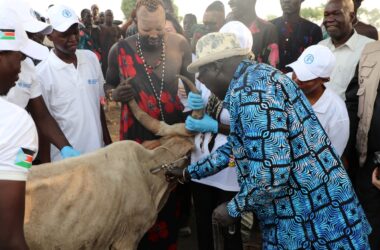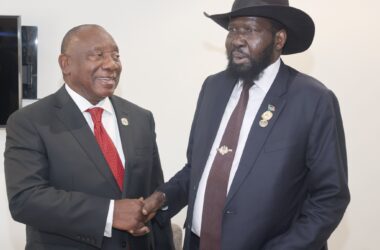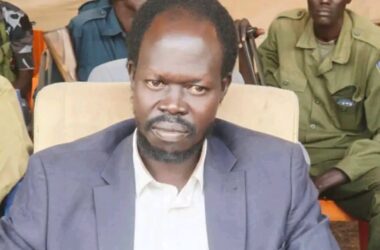By Philip Buda Ladu
Sudan People’s Liberation Movement in Opposition (SPLM-IO) alarms that the 2018 Revitalized Agreement on Resolution of Conflict in South Sudan (R-ARCSS) is on the verge of collapse, citing “sustained and systematic violations”.
In a press statement released by Deputy Chairman Oyet Nathaniel Pierino, the SPLM-IO accused the South Sudan People’s Defence Forces (SSPDF) of deliberately undermining the agreement for their “selfish interests,” echoing previous breakdowns in 2013 and 2016.
“Today the country is at the crossroads and brinks of plunging into utmost abyss and violence in which none of the Peace spoilers can even control,” Pierino stated, highlighting the erosion of trust
The SPLM-IO detailed a litany of alleged violations, including, Security Arrangement Breaches, citing reported attacks on SPLA-IO cantonment sites and training centres, forcing their withdrawal from several locations, including Turou, Morta, and areas in Unity State, Maban County, and Lowereng.
The SPLM-IO further alleges the government is attempting to create a one-party state by denying them political space and civil liberties, grabbing ministries allocated to them, like the Ministry of Petroleum and Health, and arresting their ministers.
The statement also claims that the order to confine the First Vice President, arrest and detain senior members of the Political Bureau and Military Command Council of the SPLM/SPLA-IO, National Ministers, Members of Parliament, Deputy Head of Delegation to Tumaini Government Delegation, Co-chair of Joint Defense Board is the last straw that broke the Camel’s back.
The SPLM-in Government had maintained that Dr. Machar was not under house arrest.
Pierino emphasized that the SPLA-IO has refrained from retaliating against SSPDF aggression in an effort to maintain peace, but warned that the situation has become untenable.
“We have now reached a stage where violations have become pervasive, rampant systematic and a new normal,” he said.
The group also said it will conduct internal consultations to “radically adjust” its strategy in response to the deteriorating situation.
The statement called on the guarantors of the R-ARCSS and the international community to take action to prevent a return to full-scale conflict. The main opposition group also called on the Ugandan government to not interfere in the internal affairs of South Sudan.
Meanwhile, on Wednesday this week, the Transitional Government of National Unity (TGoNU) countered a wave of international travel advisories, including a blatant warning from the United States, by asserting that the country is “calm and secure.”
This statement comes in the wake of a recent incident in Nasir County, Upper Nile State, and amidst broader concerns about escalating violence that opposition and political analysts said risk jeopardizing the revitalized agreement.
The foreign affairs ministry’s spokesperson, Amb. Apuk Ayuel Mayen in her briefing to the media on Wednesday emphasized that President Salva Kiir Mayardit had taken swift action to restore order and that security forces were actively working to maintain peace across the country.
The government’s response comes as the United States issued a Level 4 travel advisory, urging Americans not to travel to South Sudan due to “violent crime, such as carjackings, shootings, ambushes, assaults, robberies, and kidnappings.” The U.S. State Department also cited its “limited ability to provide emergency consular services” within the country.
The U.S. travel advisory highlighted the fragile peace deal between President Kiir and his first deputy President Riek Machar, noting that their political rivalry remains a significant obstacle to stability.
The 2018 peace deal, intended to end a devastating five-year civil war, has faced numerous challenges.




